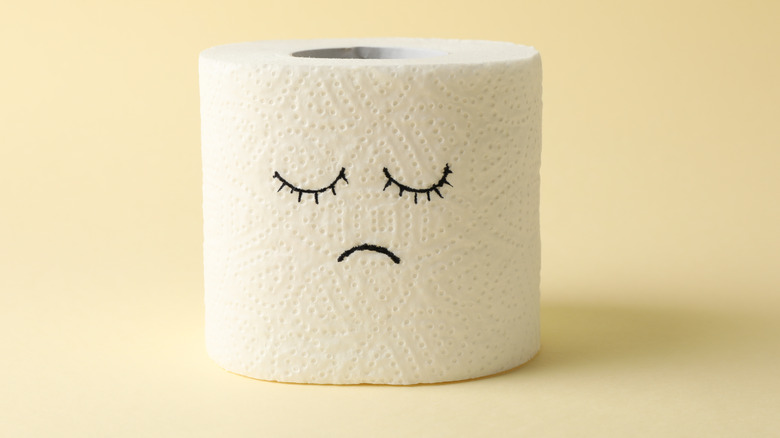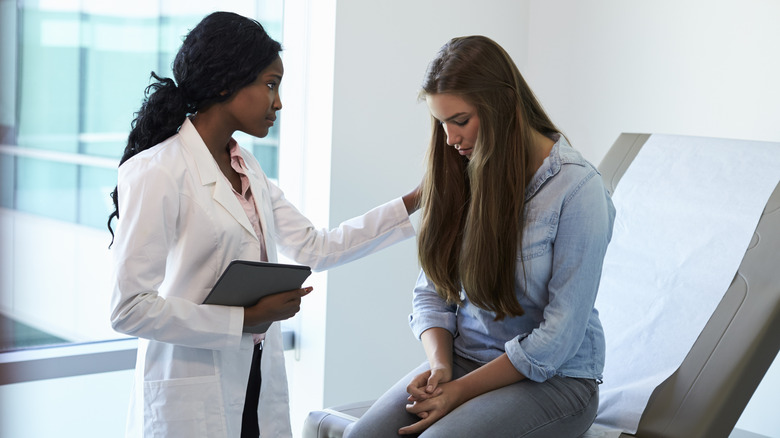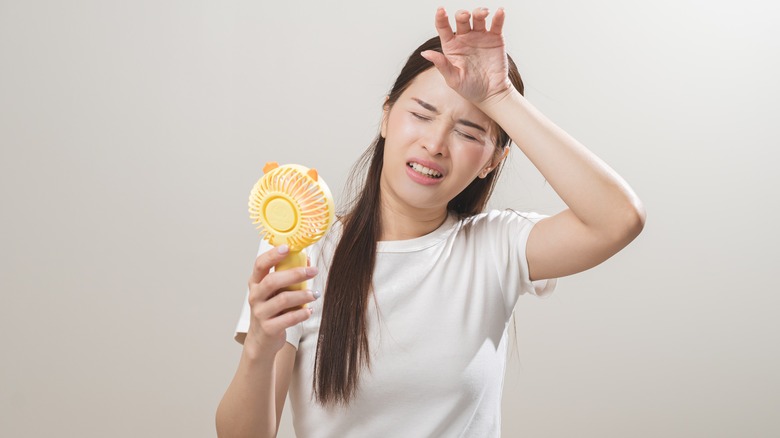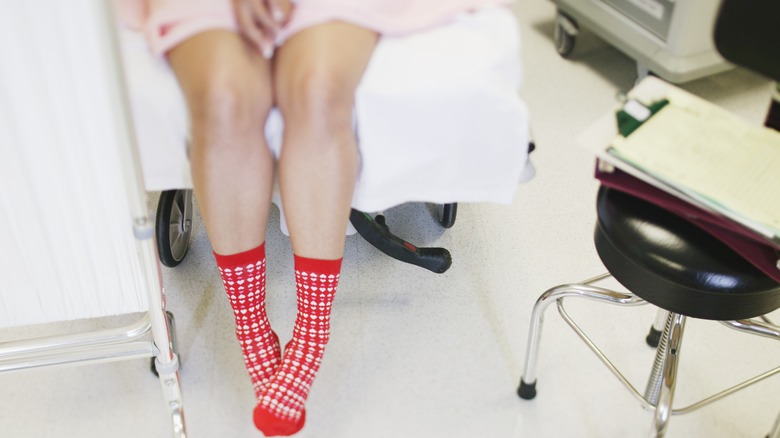The Most Embarrassing Medical Conditions That Can And Can't Be Cured
As humans with bodies, it's only natural for us to sometimes experience bodily functions that make us uncomfortable. Embarrassing medical conditions are an awkward and unfortunate part of life. From chronic bad breath to excessive sweating, these issues can profoundly affect our self-esteem and mental health. While speaking to a health professional about a less-than-desirable medical condition may seem mortifying, it's the first step towards treatment and learning how to navigate the emotional toll of living with health challenges. It's also important to seek care from a doctor about symptoms that may be a sign of an underlying health condition.
According to a research survey published by Essity, about 1 in 4 folks in the UK procrastinate visiting their doctor due to embarrassment, delaying their diagnosis of a health condition, especially if it's a bathroom-related concern. Nearly half of respondents would rather self-diagnose than consult a doctor, a choice that can dangerously delay essential treatment and increase anxiety, especially when online searches suggest you may have a life-threatening condition. It's important to remember that bowel malfunctions and other bodily functions that we might find embarrassing are common topics of conversation for healthcare professionals, who have likely encountered all that and more throughout their careers. Over time, you may discover that you're not alone in facing embarrassing medical conditions by discussing your health issues with trusted individuals.
Chronic bad breath
The dreaded garlic breath. Everybody experiences bad breath occasionally, especially after consuming pungent foods like garlic or onions. The odor from these potent foods persists because they are absorbed into the bloodstream during digestion, influencing your breath until they are fully metabolized and expelled from the body. But if your bad breath never seems to go away, you may have a deeper oral health issue called halitosis, which is medically defined as chronic unpleasant-smelling breath. This medical condition is actually quite common, affecting almost a third of the global population.
Halitosis is often a symptom of various medical conditions and can only be diagnosed by a dentist or healthcare specialist. Halitosis can be caused by poor oral hygiene, gastroesophageal reflux disease (GERD), gum disease, tonsil stones, infections, diabetes, liver disease, kidney disease, Sjögren's syndrome, or excessive dry mouth. Treatment for halitosis depends on the cause, and many of these medical conditions can lead to serious health complications if left untreated, so it's important to speak to a healthcare professional if you think you have halitosis.
Erectile dysfunction
Erectile dysfunction (ED) often evokes embarrassment because it is so closely tied to traditional notions of masculinity and sexual performance. This medical condition, characterized by the inability to achieve or maintain an erection for sexual activity, can cause feelings of inadequacy and anxiety, and can even crush self-confidence. Social stigma perpetuates these ideas, which can further discourage those experiencing ED from seeking medical help, for fear of being judged or teased. However, ED is extremely common — a 1994 study published in the Journal of Urology found that 52% of men surveyed between the ages of 40 and 70 years experience some level of ED.
ED can lead to emotional stress, including depression, low self-esteem, feelings of worthlessness, lack of concentration in daily life, relationship issues, and more. Some individuals experiencing ED don't seek treatment due to misconceptions about the cause or simply brushing it off as a symptom of getting older. An outdated belief held that ED was primarily caused by psychological issues, while it is now understood that it's more likely due to physical factors, such as impaired blood flow to the penis. ED can also be a symptom of other medical conditions, like prostate problems, diabetes, high blood pressure, high cholesterol, sleep disorders, and depression; or a side effect of drugs, alcohol, and more. Speaking with your doctor can help you determine the cause of ED and the best treatment plan for you.
Hemorrhoids
You may not know this, but we all have hemorrhoids — they only cause an issue when they become swollen and irritated. Often called piles, hemorrhoids are essentially swollen veins located on the inside or near your anus and rectum. Internal hemorrhoids don't typically cause symptoms, but external ones can feel itchy, sore, painful, or tender; and can often lead to rectal bleeding. About 5% of people in the U.S. experience hemorrhoid issues, per the Cleveland Clinic. Your risk of developing hemorrhoids increases if you are pregnant, eat a low-fiber diet, have chronic constipation or diarrhea, experience obesity, regularly lift heavy objects, spend a lot of time sitting, or often strain during bowel movements.
Many report that their hemorrhoids go away on their own and find relief in natural homecare treatments like applying witch hazel to the area, taking warm sitz baths, drinking more water, and eating more fiber. Some gastrointestinal medical conditions can display symptoms similar to hemorrhoids and can lead to serious health complications — sometimes life-threatening if left untreated. Chronic rectal bleeding can be caused by colon cancer, Crohn's disease, ulcerative colitis, or other digestive issues. That's why it's imperative to visit a healthcare professional if you are experiencing any hemorrhoid-like symptoms to receive a proper diagnosis and rule out any underlying medical conditions.
Bowel incontinence
So, what you thought was just a fart ended up being something more — talk about a mortifying moment! This embarrassing mishap is so common it even has its own term in the Urban Dictionary: "shart." Fecal incontinence, also called bowel incontinence, is defined as not being able to control when a bowel movement occurs and stool accidentally escapes. It's estimated that approximately 33% of the population has experienced bowel incontinence (via the Cleveland Clinic). Due to the stigma surrounding it, this medical condition is likely even more prevalent but often goes unreported.
While occasional accidents happen, if you're experiencing frequent bowel incontinence, it may be a sign of an underlying health issue. Bowel incontinence can be caused by pelvic floor muscle damage, nerve damage, pelvic organ prolapse (POP), or medical conditions such as diabetes, irritable bowel syndrome (IBS), inflammatory bowel disease (IBD), multiple sclerosis, and more. It's important to visit your healthcare provider to determine your individual cause and the best treatment options, which can include surgery, therapy, or medications. Some individuals find that they can manage their symptoms with dietary changes, kegel exercises, or biofeedback therapy.
Excessive gas
Just as the popular U.S. children's book says, "Everyone Poops." Gas, also called flatulence, is a natural part of the digestive process, and it's quite common to pass gas up to 25 times each day. However, more times than this may be a signal from your body indicating issues with your diet, lifestyle, or possibly an underlying medical condition such as irritable bowel syndrome (IBS), celiac disease, Crohn's disease, ulcerative colitis, small intestinal bacterial overgrowth (SIBO), or a stomach ulcer.
Excess gas, coupled with other digestive symptoms like bloating, diarrhea, and abdominal pain, could also be a sign of a potential food intolerance. Food intolerances, often mistaken for food allergies, can be challenging to identify because symptoms may not appear immediately; they can occur hours or even days after consuming a particular food. Common food intolerances include dairy, gluten, caffeine, fructose, sulfites, and more. If you experience excessive gas or other digestive issues, visiting a nutritionist or healthcare specialist is the best way to figure out if you have an underlying medical condition causing your symptoms and how to manage them.
Period problems
The menstrual cycle is a natural occurrence in the uterus. Worldwide, nearly 2 billion people experience this every month, and yet, it's rarely talked about. Some people don't have access to or can't afford menstrual products, plus periods can often be unpredictable, leading to the dreaded period leak (when blood accidentally soaks through clothing and becomes visible to others). Due to social stigma, many people feel embarrassment or guilt about their periods, and even face harassment and teasing, leading to a lack of education and misunderstandings about menstruation. This can negatively impact the physical and mental well-being of those experiencing periods.
There's no shame in tracking your cycle and understanding when it feels out of balance. Keep in mind there is no universal standard or 'normal' period; it varies from person to person. "Menstrual bleeding might happen every 21 to 35 days and last 2 to 7 days," per experts at the Mayo Clinic. 1 in 5 people experience heavy or long periods, called menorrhagia, which is indicated by changing your tampon or pad every hour for a full day or more. Menorrhagia can also come with other symptoms like painful cramps, blood clots, spotting, and more, and can be a sign of hormonal or uterine problems. Sometimes people experience a missed period that isn't due to pregnancy, called amenorrhea. This can be a sign of hormonal issues or more serious underlying medical conditions. If you're experiencing amenorrhea or menorrhagia, it's important to speak to a doctor.
Vaginal yeast infections
Yeast infections can be uncomfortable and embarrassing. They are caused by a vaginal fungal infection that leads to extreme itchiness, irritation, and sometimes discharge of the vagina. Almost 75% of women and people assigned female at birth have experienced at least one yeast infection, also called vaginal candidiasis. Many people wrongly associate yeast infections with poor hygiene or sexually transmitted diseases (STDs), though they are typically unrelated to these factors. Yeast infections are commonly caused by hormonal imbalances, taking antibiotics, a weak immune system, pregnancy, diabetes, or stress. However, they do share similar symptoms with some STDs, so it's important to visit a doctor if you're unsure.
Vaginal yeast infections can be treated with over-the-counter antifungal suppository treatments like boric acid, Vitanica Yeast Arrest, or Monistat. You can also get oral prescription medication like fluconazole (Diflucan) from your doctor. Some people find that mixing tea tree oil with coconut oil can help soothe symptoms via topical application. Be sure to speak with your healthcare professional to determine the best line of treatment, depending on your situation and the severity of your symptoms.
Herpes simplex virus
Herpes is embarrassing mainly due to social stigma, misinformation, and the personal and visible nature of the medical condition. Herpes is often wrongly associated with promiscuity or a lack of cleanliness, which are inaccurate and only perpetuate the stigma. Many people with herpes feel a fear of rejection, judgment, or guilt, often blaming themselves for contracting the virus, even though it can be transmitted without any wrongdoing, leading to feelings of anxiety, depression, and low self-esteem.
Herpes is a very common medical condition. There are two types of herpes simplex virus (HSV): HSV-1, which causes what's commonly called cold sores, and HSV-2, known as genital herpes. In some cases, HSV-1 can also cause genital herpes. The World Health Organization reports that more than half of the population — about 67% — has HSV-1 worldwide. About 17% of Americans between the ages of 14 to 49 have been diagnosed with genital herpes from either HSV-1 or HSV-2, according to Johns Hopkins Medicine.
Some people with HSV experience no symptoms or very mild ones. That's why it's common to unknowingly pass it on to others since it's contagious. Common oral herpes symptoms are cold sores in or around the mouth or lips, while typical genital herpes symptoms include bumps or blisters around the genitals or anus. These bumps are often painful, irritating, and itchy. There is no cure for herpes, but there are ways to manage the condition, including prescription medication, topical treatments to help soothe symptoms, and more.
Excessive sweating
Everyone sweats, but some people may experience hyperhidrosis, a medical condition that causes excessive sweating. Hyperhidrosis is defined as sweating that interrupts daily life and occurs primarily on the armpits, head, face, hands, and feet. It's hard to know the true statistics due to the embarrassment and stigma surrounding this medical condition. However, according to a 2020 study published by the Journal of Drugs in Dermatology, hyperhidrosis is thought to exist in almost 5% of the U.S. population — about 15.3 million people. Hyperhidrosis can cause individuals to feel stress, anxiety, or depression about sweat stains or body odor, resulting in social anxiety, self-isolation, embarrassment, and more.
There are several different potential causes for this condition. Some cases of hyperhidrosis are considered to be genetic, but certain medications can also cause excessive sweating as a side effect. Hyperhidrosis may also be an indication of an underlying health condition, like diabetes, heart disease, hyperthyroidism, menopause, infections, obesity, Parkinson's disease, and more. If you suspect you are experiencing hyperhidrosis, it's important to speak with your healthcare provider to determine the cause and proper treatment options.
Bladder control problems
Peeing your pants is just for kids, right? Think again. Bladder control problems, known as urinary incontinence (UI), are much more common than you might expect. In fact, a 2021 survey published in the Journal of Urology found that 53% of women in the U.S. experienced some level of UI. The main culprit is life events like childbirth, pregnancy, or menopause, which can weaken the pelvic floor muscles and affect the urinary tract. According to the National Institutes of Health (NIH), about 33% of men over the age of 65 experience UI, likely due to prostate issues. Other medical conditions can increase your risk of developing UI, like diabetes, obesity, Parkinson's disease, multiple sclerosis, chronic constipation, and smoking.
Living with UI can get in the way of everyday life. Many people avoid physical activity, intimacy, or other interests they enjoy for fear of having an accident, which can lead to emotional stress, depression, and social anxiety. A common misconception is that UI is a normal part of aging that can't be helped. While it's true that your risk of incontinence increases as you get older, there are also treatments available to help you manage this condition. Incontinence doesn't have to disrupt your life and keep you from being active. Speaking with your healthcare provider can help you determine which medications and treatment options are best for you.
Genital warts
Did you know that genital warts are one of the most common types of sexually transmitted diseases (STDs)? That's because it is caused by human papillomavirus (HPV), which almost every sexually active person will get at some point in their life. There are over 40 kinds of HPV that are spread by skin-to-skin contact, vaginal, anal, and oral sex. Some versions have no symptoms, while others cause genital warts, and some can cause cancer. That's why it's important to get screened for HPV (and other STDs) frequently if you are sexually active. Genital warts and HPV are contagious, so practicing safe sex is key to reducing transmission.
The type of HPV that causes genital warts is not linked with cancer, but it can't be cured. However, there are some treatment options available. Some people notice that their genital warts go away on their own because their bodies can clear the infection. Other people may receive treatment recommendations from their doctor that include options like topical skin medicine, freezing, a loop electrosurgical excision procedure (LEEP), or laser treatment.












